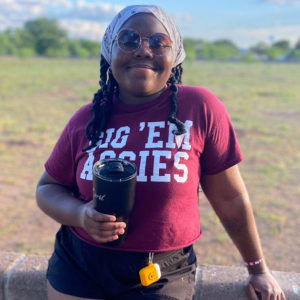Elevating Black voices, raising cultural awareness through outreach
Texas A&M student leader sheds light on importance of Black history
As a Black student leader in the Texas A&M University’s College of Agriculture and Life Sciences, sophomore animal science major Candace Foster-Johnson uses her platform to spread cultural awareness and elevate other Black voices.
Foster-Johnson serves as the diaspora education director on the Memorial Student Center Carter G. Woodson Black Awareness Committee, WBAC, where she works with other student leaders to address issues, build community and spread awareness for Black culture on Texas A&M’s campus.
“My job is to expose more people to the culture of African American people, how we do things, how we interact with each other and what it means to really operate in a predominantly white institution,” said Foster-Johnson. “Our goal is to bring more awareness to social issues that our culture faces.”
Finding community in WBAC
Foster-Johnson grew up in Abilene, where being a member of a minority group was nothing new. She knew the demographics of Texas A&M would be similar to her hometown.
“Growing up, I didn’t have a lot of people around me who were Black besides my family,” she said. “So, when I came to A&M, I was very excited, and I still really love the campus, but I realized there weren’t a lot of Black students on campus.”
Foster-Johnson joined the MSC Carter G. Woodson Black Awareness Committee her freshman year in a search for connection—a family.
“I was looking for a sense of community,” Foster-Johnson said. “When I discovered there was an organization focused on bringing light to the African American diaspora, I thought that sounded really cool.”
Founded in 1969, the group started as an ad-hoc operating committee within the Memorial Student Center, MSC, taking charge of addressing issues affecting Black students at Texas A&M and providing cultural programming and events for the university.
According to their website, the WBAC strives to provide educational programming, community-building and enriching experiences that enhance the understanding of the culture and contributions of people of African descent and their impact on society.
Excited to find her place and have an impact on the university, Foster-Johnson ran for a leadership position soon after joining WBAC and became the diaspora education director, where she oversees the organization’s educational outreach.
Foster-Johnson emphasized that the group focuses on Black history not just in America but also in Africa. One way WBAC and her group does this is through their Homeward to My Heritage initiative. She said many Black people don’t know which country or what part of Africa their ancestors came from. WBAC is trying to help solve that mystery by offering ancestry testing to Black students.
Increasing representation in higher education
A large part of Foster-Johnson’s job as diaspora education director is planning WBAC Black History Month events across campus and helping to elevate Black voices.
“I feel like our educational system hasn’t really done us justice with Black history,” she said. “There are a lot of things people just don’t know about the way people were treated and the many battles we still have to face, like colorism and racism.”
Foster-Johnson thinks it is critical to have difficult conversations as a campus community to share information and perspectives without anger or hostility.
“It’s important to be able to give people the opportunity to learn and become better allies and help with getting more racial equality in this country,” Foster-Johnson said. “It’s important that we educate people so we can work together to accomplish this.”
Craig Coates, Ph.D., associate dean for inclusive excellence in the College of Agriculture and Life Sciences, said the College recognizes this need as well. In response, the College has committed to change and developed a number of focused initiatives to improve diversity and inclusion.
“Our goals for inclusive excellence will be achieved through coordinated recruitment, mentoring, education and retention of a diverse and culturally competent faculty, staff and student body — one that promotes open dialogue, freedom of ideas and an atmosphere of respect,” Coates said.
Foster-Johnson said that representation adds more seats to the table, which is important.
“As a whole, I think the College would flourish even more being made up of diverse faces,” she said. “People from more diverse backgrounds can bring different ideas to the table and provide a more welcoming environment overall.”
Foster-Johnson believes what most people want is representation.
“If we saw ourselves in more different spaces, other than the same places we have always seen ourselves, then that would serve as a motivator for people. I feel like people want to stay with what is familiar, so they’ll stay where they’ve always been, so they won’t do things like go for higher education.”
She said more representation on college campuses could help change that thought process.
While Black History Month might be coming to a close, Foster-Johnson said her work as diaspora education director has just begun. Even after her term is over, she plans to continue sharing her experience, educating others and advocating for the perception and representation of the Black community.



